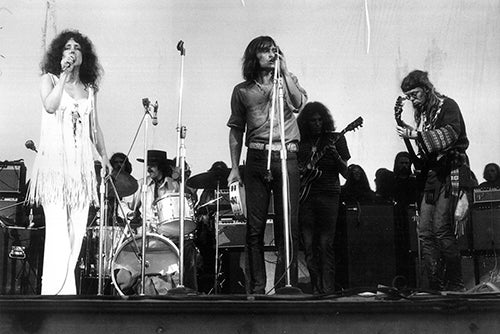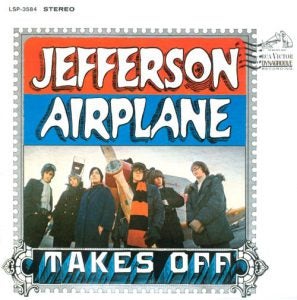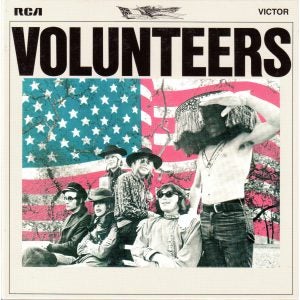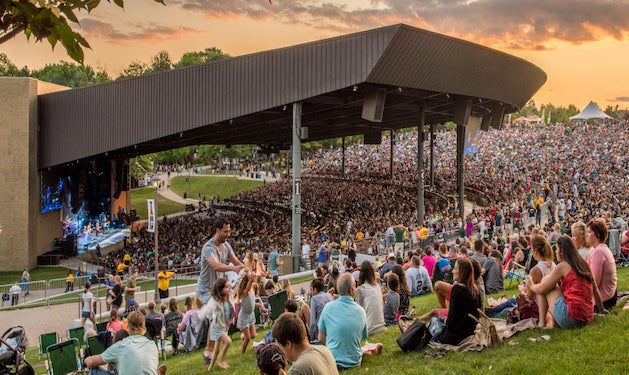“Alright friends, you have seen the heavy groups. Now you will see morning maniac music. Believe me, yeah. It’s a new dawn!” Grace Slick of Jefferson Airplane didn’t look like she had waited all night to perform Sunday morning at Woodstock. Her fringed white doeskin vest and bellbottoms looked like she had just pulled them out of the closet. And the band took it all in stride and gave a memorable performance—at 7:00 Sunday morning.
Day Two, Performer 14: Jefferson Airplane
Performed Sunday morning, August 17, 7:00–8:45 am

Jefferson Airplane performed early Sunday morning, the last set of a long Saturday Woodstock roster. Left to right: Grace Slick, Spencer Dryden, Marty Balin, Jorma Kaukonen, and Jack Casady (out of frame: Paul Kantner and Nicky Hopkins). Photo © Jason Lauré.
Jefferson Airplane Band Members
- Marty Balin: vocals
- Grace Slick: vocals
- Paul Kantner: guitar, vocals
- Jorma Kaukonen: guitar, vocals
- Jack Casady: bass
- Spencer Dryden: drums
- Nicky Hopkins: piano
Jefferson Airplane Woodstock Setlist
- The Other Side of This Life
- Somebody to Love
- 3/5 of a Mile in 10 Seconds
- Won't You Try/Saturday Afternoon
- Eskimo Blue Day
- Plastic Fantastic Lover
- Wooden Ships
- Uncle Sam Blues
- Volunteers
- The Ballad of You & Me & Pooneil
- Come Back Baby
- White Rabbit
- The House at Pooneil Corners
Jefferson Airplane defined psychedelic rock music, and their defiant attitude, stubborn independence, and soaring music epitomized the San Francisco psychedelic counterculture. If Grateful Dead are now thought of as the kings of the ’60s San Francisco scene, the truth was that at the time the ’60s were unfolding, Jefferson Airplane were very much at the top of that particular mountain of talent and influence.
The band started as a folk-rock project of Marty Balin, who had recorded a pair of solo singles in the early 1960s but which did not find success. Delving into the folk scene of that time, Balin spent a few years working with a folk group known as The Town Criers. Following the success of The Beatles, The Byrds, and Simon & Garfunkel, Balin decided to infuse his folk with rock and roll, and began to look for like-minded musicians to start his new band with. Shortly thereafter, he met another folk guitarist and vocalist by the name of Paul Kantner. The pair hit it off immediately and set out to recruit musicians to play as the house band at The Matrix, the San Francisco club that Balin owned on Fillmore Street in the heart of San Francisco.
The band’s ranks were filled out quickly. Lead guitarist Jorma Kaukonen was an old friend of Kantner’s from his folk music days. Vocalist Signe Anderson was discovered by Balin and Kantner while she was singing at a bar called The Drinking Gourd (where Balin and Kantner had met not long before) and recruited into the band immediately. The initial band lineup was completed by drummer Jerry Peloquin and bassist Bob Harvey. The name of the band was coined by Kaukonen who, in his days as a blues guitar player, had been given the nickname Blind Thomas Jefferson Airplane.
By October 1965, Peloquin and Harvey had departed the band and were replaced respectively by Skip Spence (later the founding guitarist of Moby Grape) and Jack Casady, an extraordinary bass player who had grown up with Kaukonen in Washington D.C. With the initial Jefferson Airplane lineup now solidified, it did not take long for the band to gain a large following in the San Francisco Bay Area, and the band was driven to greater popularity by the support of influential music critic Ralph J. Gleason (later one of the leading lights of Rolling Stone magazine), who declared The Airplane to be “one of the best bands ever.”
In November 1965, a mere three months after the band had played their first gigs, the group signed a recording contract with RCA Records. Their first single, the Balin-penned “It’s No Secret,” failed to chart but paved the way for the band to record their debut LP, Jefferson Airplane Takes Off. The album was moderately successful, with the bulk of its sales coming understandably from the Bay Area. The band continued to play shows and gain popularity while enduring key personnel changes that would result in the formation of the classic lineup of the band. After the recording of this first album was completed in March 1966, Skip Spence left the band and was replaced by the dynamic drummer Spencer Dryden. In November 1966, Signe Anderson left to be a full-time mother to the daughter she’d had the previous spring, and she was replaced by a powerhouse vocalist by the name of Grace Slick, whose previous band, the Great Society, had played alongside The Airplane at a number of shows.

Jefferson Airplane Takes Off, didn't sell well
but showed glimpses of what they were to be
With the lineup now firmly in place, Jefferson Airplane started work on their second studio album. Grace Slick’s influence was immediately apparent on Surrealistic Pillow (a title suggested by Grateful Dead guitarist Jerry Garcia, who played on the album and assisted with its production), to which she added two songs previously performed by The Great Society: “Somebody To Love” (written by her then brother-in-law Darby Slick) and her own cryptic psychedelic paean “White Rabbit.” Balin, Kantner, and Kaukonen also contributed classic tracks to the album. Released in February 1967, the album was a huge success, peaking at #3 on the Billboard Top 200 chart and staying in the chart well into 1968.

cemented Jefferson Airplane's status among rock royalty
Heavy touring continued throughout 1967, and the band released its third LP, After Bathing At Baxter’s in November 1967. A top 20 LP, the album signaled a sea change in the musical approach of Jefferson Airplane, with an emphasis on a heavier sound and experimentation. This approach continued with the band’s fourth album, Crown of Creation, released in September 1968, which became the band’s second top 10 album. In October 1968, Jefferson Airplane recorded shows at Bill Graham’s Fillmore East and West for a live album, Bless Its Pointed Little Head. This album made it into the top 20, the fourth Airplane album to achieve that feat.
By early 1969, Kaukonen and Casady, along with drummer Joey Covington, were playing shows on the side as the blues-based trio Hot Tuna, though The Airplane continued to tour throughout the year. They began work on their next album, Volunteers, in the spring of 1969. The songs written for this album featured a decidedly political bent to the lyrics (“We Can Be Together,” “Volunteers”), which fit in perfectly with the politically-charged atmosphere in 1969. The album would not be released until later in the year, but the Airplane was playing some of the songs in their live shows that summer, including at Woodstock.

Jefferson Airplane performed
several cuts from their fifth studio album, Volunteers
With the sun having now ascended over the horizon, a tired-sounding Chip Monck introduced, at 7:00 am on Sunday morning, the act intended to headline Saturday’s proceedings. This was Jefferson Airplane, and unsurprisingly they were somewhat the worse for wear. Apart from having been awake for close to 24 hours at this point (having arrived on-site Saturday morning), the members of The Airplane had partied rather hard while waiting for their turn. They had brought with them plenty of tabs of salmon-pink LSD (which vocalist Grace Slick would describe as “orange”) with them and had tripped merrily through the night. The band members were still plenty high when they took to the stage and sounded it, delivering a performance that managed to be both ragged and spirited at the same time.
Promising that the crowd will experience some “morning maniac music,” Grace Slick introduced “the regular guys and Nicky Hopkins,” the distinguished session pianist accompanying The Airplane at this gig. The band opened with their cover of Fred Neil’s “The Other Side Of This Life,” their standard opener in this era. Grabbing the crowd’s attention, the band then cranked out a rendition of one of their biggest hits, “Somebody To Love,” from 1967’s Surrealistic Pillow album. In her highly lit-up state, Grace complained of shocks from her microphone “every time I put my hand on it,” probably as the result of poor electrical grounding.
Another tune from Surrealistic Pillow followed with vocalist Marty Balin’s “3⁄5 of a Mile in 10 Seconds.” Evoking the 1967 Summer of Love in their hometown of San Francisco, a gentle medley of “Saturday Afternoon” and “Won’t You Try” (from the 1968 album After Bathing At Baxter’s) washed peacefully over the crowd before they whipped out a dynamic version of “Eskimo Blue Day,” an ecologically-minded song from their new album Volunteers featuring a stunning Grace Slick lead vocal.
Marty Balin’s “Plastic Fantastic Lover” (a song about television from Surrealistic Pillow) kept the program moving ahead before another new tune from Volunteers was pulled out. This was “Wooden Ships,” a song about a post-apocalyptic flight to freedom that was co-written by Los Angeles rock star-types Stephen Stills and David Crosby (Crosby, Stills & Nash had recently released their own version of this on their first album). This was the first opportunity for the Airplane to take flight, extending the number out to great length and relentlessly pursuing the possibilities inherent in the song’s construction.
Guitarist Jorma Kaukonen then stepped up for a taste of the lead vocal with his own “Uncle Sam Blues,” an anti-war tune that would go unrecorded in a studio setting. Following a boisterous workout on the title track from Volunteers, the main set ended with an extended reading of “The House At Pooneil Corners” from After Bathing At Baxter’s, the crowd screaming for more despite their exhausted state. The band returned quickly, Kaukonen taking the mic again for a rendition of Walter Davis’ classic blues number “Come Back Baby.”
Again returning to more crowd-pleasing material, the group then traipsed through their 1967 hit “White Rabbit,” with Grace Slick particularly effective in her handling of the dramatic vocal. For a final blowout, the band chose “The House At Pooneil Corners” from the 1968 album Crown of Creation, which again left the spent crowd baying loudly for more. It was 8:45 am, and it was finally time for the Woodstock crowd to get a bit of sleep.
After Woodstock, Jefferson Airplane went through more personnel changes but continued to record and perform. Spencer Dryden was forced out of the group in 1970, and he joined New Riders of the Purple Sage two years later. Marty Balin left the group in 1971. Tensions continued growing within the band as they began to split into two camps: Kantner/Slick and Kaukonen/Casady. Eventually, these tensions became unbearable, and in 1972 Jefferson Airplane broke up. While Kaukonen and Casady continued to work as Hot Tuna, Kantner and Slick formed Jefferson Starship, the next evolutionary step from Jefferson Airplane. That band continued to record and perform until 1985 when Kantner left, taking the “Jefferson” portion of the name with him. Grace Slick stayed on with the pop-oriented third incarnation of the band Starship, who had several hits before Slick left the band in 1988. 1989 would see a reunion of the classic Jefferson Airplane lineup (minus Spencer Dryden), and they stayed together long enough to record an album and tour behind it before dissolving again.
The Jefferson Airplane legacy has continued to this day through the music of Jefferson Starship, Starship, Hot Tuna, and various other incarnations of the individual musicians’ work. Grace Slick retired from the music business following the Jefferson Airplane reunion tour in 1989. Spencer Dryden passed away from colon cancer in 2005, while Paul Kantner was felled by a heart attack on January 28, 2016, coincidentally on the same day that Jefferson Airplane’s original lead vocalist Signe Anderson passed away after a battle with COPD. Jefferson Airplane founding member Marty Balin passed away on September 27, 2018, leaving behind a musical legacy that will no doubt excite and delight generations of music lovers to come. Jack Casady and Jorma Kaukonen continue to record and tour as Hot Tuna.
—Wade Lawrence & Scott Parker
